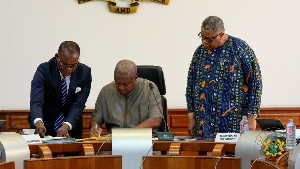Global Affairs Canada in collaboration with Plan International, Non-Governmental Organisations are funding the implementation of the GHC40,000 project to provide entrepreneurial skills training to enhance the socio-economic livelihoods of vulnerable women in the Sunyani Municipality.
Titled “Women Empowerment and Enterprise Development (WEED) Project”, the five-month project being implemented by the Global Media Foundation (GLOMeF), a Sunyani-based human rights and media advocacy NGO would further promote women inclusion in decision-making processes and also overcome all forms of sexual and gender-based violence.
It would directly provide employable skill training to 500 vulnerable women including People with Disabilities (PWDs) who would engage in mushroom production and soap preparation to create jobs for themselves.
Speaking at a stakeholder meeting in Sunyani, Miss Christiana Kwakye, the GLOMeF Project Coordinator, said the COVID-19 pandemic had had a huge toll and disrupted economic activities of many women in the Sunyani Municipality.
“The COVID-19 pandemic has virtually affected and collapsed economic activities of an increasing number of women entrepreneurs. They are facing several constraints that have affected the survival and growth of their businesses”, she said.
Ms Kwakye said many businesswomen and traders in the Municipality had a lot of limitation in management, financial literacy, creativity and dynamism and self-confidence, saying the project would improve business development and entrepreneurship skills as well as connect and help the beneficiaries to access credit facilities to establish and expand their economic activities.
Mr Raphael Godlove Ahenu, the Founder and Chief Executive Officer of the GLOMeF, thanked the funding partners and called on the beneficiaries to take particularly the training aspect of the project seriously to build on their socio-economic lives.
Regional News of Wednesday, 31 March 2021
Source: GNA
Two NGOs to provide entrepreneurial skills to 500 women
Entertainment












